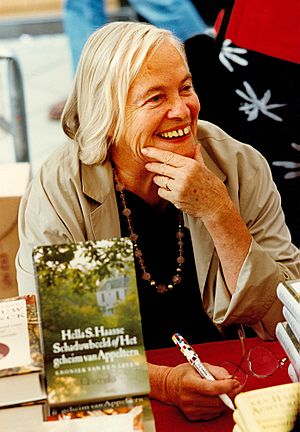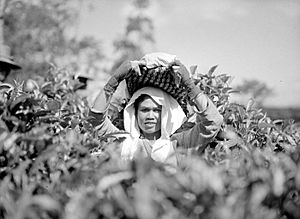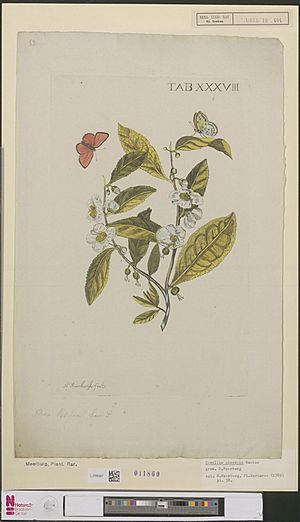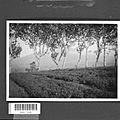Hella Haasse facts for kids
Quick facts for kids
Hella Haasse
|
|
|---|---|

Amsterdam, July 2006
|
|
| Born | Hélène Serafia Haasse 2 February 1918 Batavia, Dutch East Indies |
| Died | 29 September 2011 (aged 93) Amsterdam, Netherlands |
| Alma mater | University of Amsterdam |
| Period | 1948–2011 |
| Subject | Historical novels, Dutch East Indies-Netherlands relationship |
| Notable awards | 19 total (inc. 2 honorary degrees and P.C. Hooft Award) |
| Spouse | Jan van Lelyveld (1944–2008; his death); 3 children |
Hélène "Hella" Serafia Haasse (born February 2, 1918 – died September 29, 2011) was a famous Dutch writer. Many people called her the "Grande Dame" (or "Great Lady") of Dutch literature. Her novel Oeroeg (published in 1948) was read by many Dutch students for years.
One of her most famous books is Heren van de Thee, which means The Tea Lords. In 1988, Hella Haasse was chosen to interview the Dutch Queen. Another well-known Dutch author, Adriaan van Dis, even called her "the Queen among authors."
Hella Haasse was the first Dutch author to have a special online museum. This digital museum shows her life and work. It opened in 2008, on her 90th birthday. There is even an asteroid named after her!
Contents
Early Life and Studies
Hélène Serafia Haasse was born on February 2, 1918. Her birthplace was Batavia (now called Jakarta). This city was the capital of the Dutch East Indies (now Indonesia). Her father, Willem Hendrik Haasse, was a civil servant and writer. Her mother, Katharina Diehm Winzenhöhler, was a concert pianist. Hella also had a brother named Wim, born in 1921.
Before Hella's first birthday, her family moved to Buitenzorg (Bogor). This was because the milder climate was better for her mother's health. In 1920, they moved to Rotterdam in the Netherlands. Her father had a temporary job there.
In 1922, the family moved back to the Indies, to Soerabaja (Surabaya). Hella went to kindergarten and then a Catholic primary school there. When her mother became ill, Hella stayed with her grandparents. She also spent time at a boarding school. In 1928, her mother got better. The whole family moved back to the Indies, to Bandoeng (Bandung).
In 1930, the Haasse family moved to Buitenzorg again. A year later, they moved back to Batavia. Hella attended the Bataviaas Lyceum, a secondary school. She was an active member of the school's literary club, Elcee. In 1935, her family visited the Netherlands. This trip made Hella notice the differences between Dutch and East Indian society. She finished school in 1938.
After school, Hella moved to the Netherlands to study Dutch. But she soon changed her mind. She decided to study Scandinavian languages and literature at the University of Amsterdam. In Amsterdam, she joined a student theater group. There, she met Jan van Lelyveld, who would become her husband. He invited her to work as an editor for a magazine called Propria Cures in 1940.
Dutch East Indies Literature
A big part of Hella Haasse's writing is about the Dutch Indies literature. Her first book, Oeroeg (1948), takes place in the Dutch East Indies. This is where Hella was born and lived for most of her first 20 years. Other books, like Krassen op een rots (1970) and Sleuteloog (2002), also talk about her life in the East Indies.
Sleuteloog has a similar theme to Oeroeg. It asks if a friendship between a Dutch colonist and an Indonesian child is truly possible. Can they really understand each other?
Oeroeg was very popular and reprinted many times. However, it also caused some debate. An older author named Tjalie Robinson criticized it. He was an Indo (Eurasian) writer. Tjalie Robinson felt the characters in the story were not believable. He was living in the Dutch East Indies at the time. He hoped for friendship between the Dutch and Indonesians. He thought Oeroeg was too negative.
A movie based on the book Oeroeg was released in 1993.
Hella Haasse's famous book Heren van de Thee was translated into English as The Tea Lords in 2010. It is a historical novel about colonial times. It is set in the Dutch East Indies in the 19th and 20th centuries. The story is based on old family papers. These papers belonged to the families who owned tea plantations in the book.
Awards and Recognition
Hella Haasse was very successful and well-liked by critics. She won many awards over the years. She received prizes for her first novel in 1948 and her last novel in 2003.
Some of her most important awards for her entire body of work include:
- The Constantijn Huygens Prize in 1981.
- The P. C. Hooft Award in 1984.
She also won the Annie Romein Prize and the Dirk Martens Prize. She won the Prize of the Public of the NS twice. Hella Haasse is the only author who wrote the special annual "Boekenweekgeschenk" (Book Week Gift) three times. She wrote it in 1948, 1959, and 1994.
International Recognition
Hella Haasse lived in France for many years, from 1981 to 1990. A lot of her books have been translated into French. The '‘Académie Française’' (French Academy) gave her the Diplôme de médaille Argent in 1984. This is a special silver medal. The next year, she gave a speech about colonial literature at the University of Dakar in Senegal. In 2000, she received the Officier dans l’Ordre de la Légion d'Honneur. This is a very high French award.
Haasse also received honorary degrees from universities. She got an honorary literary doctorate from the University of Utrecht in 1988. She also received one from the Belgian University of Leuven in 1995. In 1987, she became an honorary member of the Belgian Royal Literary Academy in Gent.
In 1996, the Chilean Ministry of Education gave her a prize. It was for her "universal contribution to culture."
In 1989, the city of Boston in the USA gave her a 'Boston Certificate of Recognition'. This was for her book In a Dark Wood Wandering. The certificate thanked her for her "outstanding contributions to the City of Boston."
In 1992, Hella Haasse attended the opening of the IKAPI 'International Book Fair' in Jakarta. This was the last time she visited her birthplace, Java. It was also the year her famous book Heren van de Thee was published.
Gallery
See also
 In Spanish: Hella Haasse para niños
In Spanish: Hella Haasse para niños
- Louis Couperus (1863–1923)
- Victor Ido (1869–1948)
- Ernest Douwes Dekker (1879–1950)
- Maria Dermoût (1888–1962)
- Edgar du Perron (1899–1940)
- Beb Vuyk (1905–1991)
- Rob Nieuwenhuys (1908–1999)
- Adriaan van Dis (1946– )
- Ernst Jansz (1948– )
- Marion Bloem (1952– )
 | James B. Knighten |
 | Azellia White |
 | Willa Brown |






